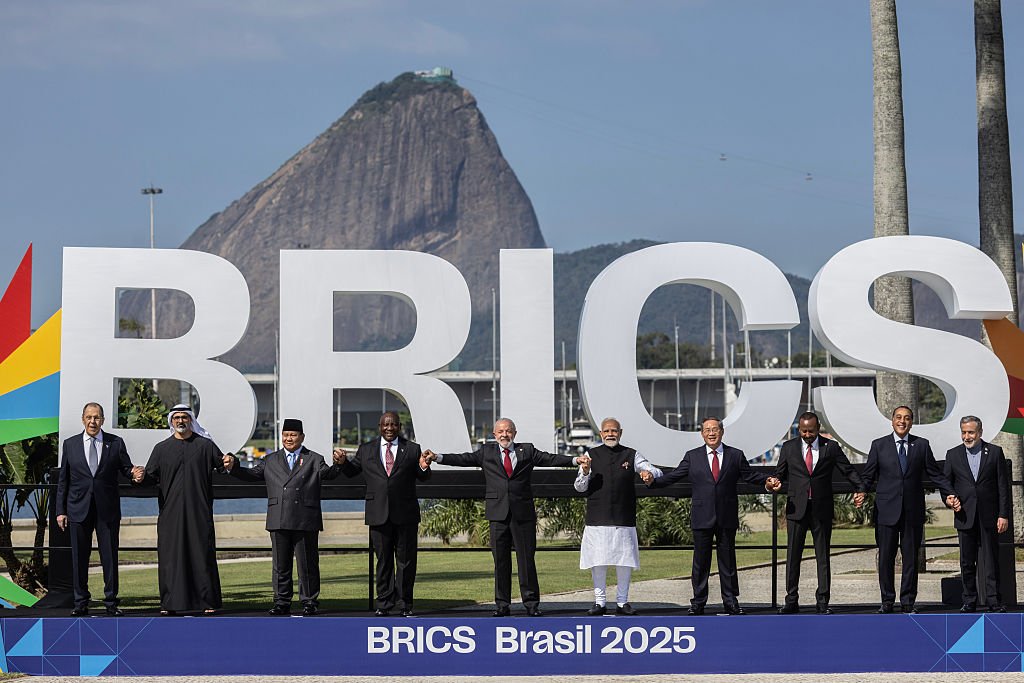The 17th BRICS Summit, held in Rio de Janeiro earlier this month, underscored a key paradox in international politics: a bloc often dismissed as fragmented and ineffective managed to provoke an immediate and forceful economic reaction from the United States—arguably the world’s most powerful nation.
The summit’s proposals—ranging from creating alternatives to dollar-based financial systems to launching a Multilateral Guarantee Fund and expanding cooperation—led President Donald Trump to announce a 10% tariff on countries he claimed were pursuing “anti-American policies.” Days later, he escalated tensions by imposing a sweeping 50% tariff on all Brazilian imports. Though officially justified by alleged political persecution of Trump ally Jair Bolsonaro and claims of “unfair trade,” the measures were widely seen as a response to the BRICS alliance.
Trump publicly ridiculed BRICS as a “little group fading out fast” and warned it would “collapse quickly if they ever got serious.” He further declared that losing the dollar’s status as global reserve currency would be tantamount to “losing a world war”—a scenario he vowed the U.S. would never allow.
Ironically, such threats and sanctions suggest BRICS is far from irrelevant. On the contrary, they highlight the bloc’s increasing capacity to disrupt entrenched global hierarchies. Efforts to delegitimize BRICS reflect a strategic attempt to contain emerging centers of power before they fully mature.
According to Celso Amorim, top foreign policy adviser to Brazilian President Luiz Inácio Lula da Silva, Trump’s hostile response is actually strengthening ties among BRICS members. “These attacks are reinforcing our commitment to BRICS,” Amorim told the Financial Times on July 27. “We want diversified partnerships, not dependence on any one country.”
Despite persistent criticism—such as lack of cohesion, internal inequalities, and China’s outsized influence—BRICS is gaining traction as a counterbalance to Western-dominated institutions. Critics often paint the bloc as ideologically “anti-Western,” transforming calls for reform in global governance into perceived threats against liberal democratic values. But these portrayals obscure the bloc’s real mission: promoting multipolarity and reforming a global system that disproportionately benefits the historically privileged.
A New Political Arena
The Rio summit marked several tangible developments. Brazil unveiled a roadmap for a cross-border payment system aimed at reducing reliance on the U.S. dollar. The creation of BRICS Pay—a shared financial infrastructure—was also announced. Climate change featured prominently, with the bloc endorsing Brazil’s Tropical Forests Forever initiative and denouncing measures like the EU’s carbon border tax as barriers to equitable transitions.
Perhaps most significantly, the bloc launched a Multilateral Guarantee Fund through the New Development Bank (NDB), modeled after the World Bank’s Multilateral Investment Guarantee Agency (MIGA). This fund is designed to reduce risk for investors and mobilize private capital for infrastructure and climate projects in the Global South. President Lula even framed BRICS as the ideological successor to the Non-Aligned Movement, positioning it as a “third way” in global politics.
Still, translating vision into action won’t be straightforward. Institutional disparities—ranging from regulatory mismatches to divergent economic agendas—pose real hurdles. Initiatives like BRICS Pay and the guarantee fund will require deep technical collaboration and sustained political commitment. And the dominance of the IMF, World Bank, and U.S. dollar in global finance won’t fade easily.
Yet, judging BRICS solely on short-term outcomes risks overlooking its broader influence. The ability to shift narratives, influence expectations, and trigger strategic reactions is itself a form of geopolitical power.
Preemptive Containment and Western Contradictions
The bloc is also expanding. With Indonesia, Egypt, Ethiopia, Iran, and the United Arab Emirates (UAE) recently joining, and more than 30 nations expressing interest, BRICS is rapidly becoming a platform for alternative diplomatic alignments. This expansion signals a shift in soft power, as countries seek greater autonomy in an increasingly multipolar world.
Labeling BRICS as “anti-Western” before its institutions fully mature is a preemptive effort to discredit alternatives to the liberal international order during a moment of visible strain. This isn’t a debate over performance—it’s a battle to define legitimacy.
These efforts expose contradictions in Western institutions. The G7, for instance, champions democratic values but maintains strategic alliances with autocratic regimes like Saudi Arabia. Meanwhile, BRICS’ political diversity is framed as a weakness, not as a reflection of global pluralism.
In development finance, the G7 speaks of equity while blocking IMF reforms that would empower emerging economies. When BRICS responded by creating the New Development Bank, critics dismissed it as toothless. Divergences within the G7 are portrayed as healthy pluralism; within BRICS, they’re framed as dysfunction.
European skepticism remains high—particularly toward initiatives like BRICS Pay and efforts to build alternative financial systems. Many EU analysts view the bloc as a geopolitical tool of China and Russia, aimed at undermining Western-centered multilateralism. Concerns over human rights, governance standards, and transparency continue to dominate Western criticisms, with BRICS perceived as a challenge to the normative architecture long used to justify global leadership.
Redefining Legitimacy in Global Governance
BRICS doesn’t claim legitimacy by mimicking Western institutions—it draws power from demographic and economic relevance. Representing nearly half the global population and over a quarter of the world’s GDP, the bloc’s influence is tied to present-day realities, not historical advantage.
Its informal structure—lacking a permanent secretariat or legal charter—is often cited as a flaw. Yet this fluidity may prove beneficial in an era of rapidly shifting geopolitical currents.
Efforts to delegitimize BRICS are essentially efforts to protect inherited power by narrowing the definition of credible cooperation models. But the 2025 Rio Summit proved that alternative frameworks are not just hypothetical—they are already being constructed.
As the Global South grows more assertive, the global contest is no longer between well-established institutions and unproven challengers. It is between two visions of world order: one grounded in historical privilege, and the other in contemporary representation.
In a rapidly evolving world, legitimacy is not a fixed asset—it is dynamic, negotiated, and increasingly multipolar. And BRICS, despite its imperfections, is no longer asking for recognition. It is asserting its place.



